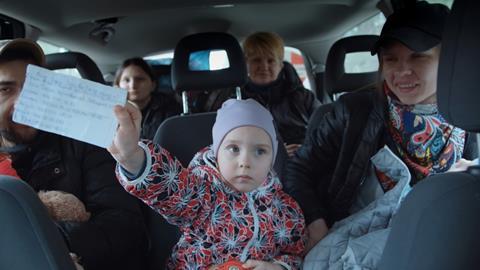Aid worker/filmmaker Maciek Hamela gives a voice to ordinary Ukranians as they flee war

Dir: Maciek Hamela. Poland/France/Ukraine. 2023. 84mins
In the cramped backseat of a nondescript mini-van driven by Polish aid worker-turned-director Maciek Hamela, squashed up against each other and clutching their minimal possessions, Ukranian refugees journey from their war-torn homeland to the safety of the Polish border. Women vastly outnumber men, most of whom are staying behind to fight; some travel alone, many with their children, a few with their pets. As they pass ruined buildings and military outposts, this intimate space becomes something of a confessional, their voices — some defiant, some broken — speaking to the emotional cost of conflict. Respectful, frank and moving, this is a small film with a devastating impact.
A small film with a devastating impact
Joining a growing number of documentaries about Ukraine, In The Rearview’s square focus on the experiences of the Ukrainian people will likely strike a chord as it plays Sheffield Doc/Fest’s International Competition following a premiere in Cannes Acid section. While Hamela attempts a truly heroic endeavour, he keeps the camera turned on his passengers at all times; this authentic approach should appeal to specialist distributors and curated streaming platforms, and could also see the film become a tool for activism, education and awareness.
Born in Warsaw and having studied in Russia, Hamela first traveled to Ukraine to document the 2013 Maidan Revolution. When Russia invaded in 2022, he felt compelled to help and bought a van in order to transport refugees — at first, families of friends — into Poland. Hamela quickly built up a network of volunteers and began working with international aid organisations to reach desperate Ukrainians across the country. More than 15m people — a third of the country’s population — have fled since the outbreak of war.
Whether Hamela picks up his passengers from city tower blocks or rural villages, there is an ever-present fear. Gunshots echoe in the distance, fires burn on the horizon, military vehicles and burnt out cars litter the roadside, mines and ruined bridges block his path. Hamela and his support drivers (who also serve as defacto cameramen) are risking their own safety, yet they fully understand that they are not the protagonists of this unfolding story.
The camera is constantly trained on the procession of displaced Ukranians, with superb editing from Piotr Oginski ensuring that, while we never spend more than a few minutes with each group (and we are not given any context or even their names, although all appear in the end credits) we get a real sense of who they are; their unique personalities, interpersonal dynamics, senses of humour and ways of coping. What unites them all, however, is a palpable shock that their ordinary lives have been ripped asunder.
Underpinned by a sensitive, unobtrusive score by Antoni Komasa-Łazarkiewicz, the passengers share their stories. A pregnant young woman describes how she acts as a surrogate mother to earn money to open her dream cafe; after her Ukranian clinic closed, she hopes to find help in Europe. A farming family shed tears over abandoning their cow, named Beauty. An elderly man takes a clothes iron to his wife who, he says, is still nagging him by phone from across the border. A woman speaks about burying the bodies of her neighbours, a young man about being tortured by Russian soldiers. A Congolese woman is transported with care, a bullet lodged in her ribs following a military shooting, to a waiting ambulance in Germany. Children — and there are many — describe the sounds of bombing, the trauma of leaving family members behind. One five year old girl, Sanya, is so traumatised she has stopped speaking.
It’s an impossible patchwork of pain, but it is threaded through with a resilience, a shared determination to return. “I just want to sleep in my own bed,” implores a woman, desperate for a simple human comfort that we all take for granted. Unfortunately, that will take longer than she imagines, a knowledge which underpins the myriad sadnesses of In The Rearview.
Production companies: Affinity Cine, Impakt Film
International sales: Cinephil info@cinephil.com
Producers: Piotr Grawender, Maciek Hamela
Cinematography: Yura Dunay, Wawrzyniec Skoczylas, Marcin Sierakowski, Piotr Grawender
Editing: Piotr Ogiński
Music: Antoni Komasa-Łazarkiewicz















![[L-R]: Amanda Villavieja, Laia Casanovas, Yasmina Praderas](https://d1nslcd7m2225b.cloudfront.net/Pictures/274x183/6/4/1/1471641_pxl_20251224_103354743_618426_crop.jpg)








